 W
WBlood diamonds are diamonds mined in a war zone and sold to finance an insurgency, an invading army's war efforts, or a warlord's activity. The term is used to highlight the negative consequences of the diamond trade in certain areas, or to label an individual diamond as having come from such an area. Diamonds mined during the recent civil wars in Angola, Ivory Coast, Sierra Leone, Liberia, Guinea, and Guinea Bissau have been given the label. The term conflict resource refers to analogous situations involving other natural resources.
 W
WWar brides are women who married military personnel from other countries in times of war or during military occupations, a practice that occurred in great frequency during World War I and World War II.
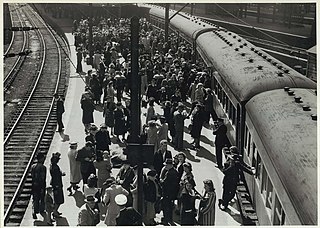 W
WIn 1945 and 1946 several "bride trains" were run in Australia to transport war brides to or from ships.
 W
WChristmas in the United States during the post-war years (1946–1964) reflected a period of peace, productivity, and prosperity. Americans staged sumptuous Christmases and enjoyed a variety of holiday foods unknown to previous generations. Several films, foods, toys, and television programs of the era have become American Christmas traditions.
 W
WCombat stress reaction (CSR) is a term used within the military to describe acute behavioral disorganization seen by medical personnel as a direct result of the trauma of war. Also known as "combat fatigue" or "battle neurosis", it has some overlap with the diagnosis of acute stress reaction used in civilian psychiatry. It is historically linked to shell shock and can sometimes precurse post-traumatic stress disorder.
 W
WLa Cruz Blanca Neutral was a volunteer infirmary and relief service established during the Mexican Revolution to care for those wounded in the conflict. The Red Cross refused to treat insurgents and the Neutral White Cross was developed to treat all combatants. After their initial success in Ciudad Juárez, the organisation spread out through 25 states in Mexico for the duration of the war. It continued as a quasi-governmentally subsidised organisation into the 1940s, when it was converted into an organisation to assist children. The organisation is still operating in Mexico City.
 W
WDepleted uranium is uranium with a lower content of the fissile isotope U-235 than natural uranium. Natural uranium contains about 0.72% U-235, while the DU used by the U.S. Department of Defense contains 0.3% U-235 or less. The less radioactive and non-fissile uranium-238 constitutes the main component of depleted uranium. Uses of DU take advantage of its very high density of 19.1 g/cm3.
 W
WStudy of the environmental impact of war focuses on the modernization of warfare and its increasing effects on the environment. Scorched earth methods have been used for much of recorded history. However, the methods of modern warfare cause far greater devastation on the environment. The progression of warfare from chemical weapons to nuclear weapons has increasingly created stress on ecosystems and the environment. Specific examples of the environmental impact of war include: World War I, World War II, the Vietnam War, the Rwandan Civil War, the Kosovo War and the Gulf War.
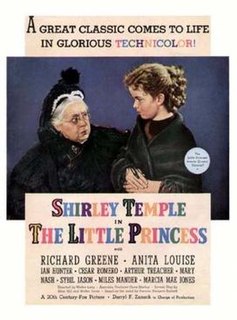 W
WThe Little Princess is a 1939 American drama film directed by Walter Lang. The screenplay by Ethel Hill and Walter Ferris is loosely based on the 1905 novel A Little Princess by Frances Hodgson Burnett. The film was the first Shirley Temple movie to be filmed completely in Technicolor. It was also her last major success as a child star.
 W
WA Long Way Gone: Memoirs of a Boy Soldier (2007) is a memoir written by Ishmael Beah, an author from Sierra Leone. The book is a firsthand account of Beah's time as a child soldier during the civil war in Sierra Leone (1990s). Beah was 12 years old when he fled his village after it was attacked by rebels, and he wandered the war-filled country until brainwashed by an army unit that forced him to use guns and drugs. By 13, he had perpetrated and witnessed numerous acts of violence. Three years later, UNICEF rescued him from the unit and put him into a rehabilitation program that helped him find his uncle, who would eventually adopt him. After his return to civilian life he began traveling the United States recounting his story.
 W
WThe Nagasaki Atomic Bomb Museum is in the city of Nagasaki, Japan. The museum is a remembrance to the atomic bombing of Nagasaki by the United States of America 9 August 1945 at 11:02:35 am. Next to the museum is the Nagasaki National Peace Memorial Hall for the Atomic Bomb Victims, built in 2003. The bombing marked a new era in war, making Nagasaki a symbolic location for a memorial. The counterpart in Hiroshima is the Hiroshima Peace Memorial Museum. These locations symbolize the nuclear age, remind visitors of the vast destruction and indiscriminate death caused by nuclear weapons, and signify a commitment to peace.
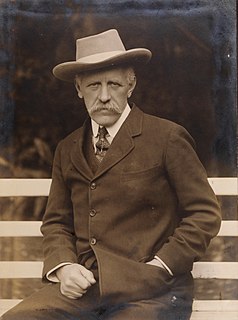 W
WThe Nansen International Office for Refugees was an organization established in 1930 by the League of Nations and named after Fridtjof Nansen, soon after his death, which was internationally in charge of refugees from war areas between 1930 and 1939. It is noted for developing the Nansen passport which allowed stateless people to travel between countries. It received the Nobel Peace Prize in 1938.
 W
WThe National Reconstruction Bureau of Pakistan was an independent and constitutionally established federal institution tasked with economic recovery and prosperous development through the local government system. It was dissolved in May 2011.
 W
WNuclear fallout is the residual radioactive material propelled into the upper atmosphere following a nuclear blast, so called because it "falls out" of the sky after the explosion and the shock wave has passed. It commonly refers to the radioactive dust and ash created when a nuclear weapon explodes. The amount and spread of fallout is a product of the size of the weapon and the altitude at which it is detonated. Fallout may get entrained with the products of a pyrocumulus cloud and fall as black rain. This radioactive dust, usually consisting of fission products mixed with bystanding atoms that are neutron-activated by exposure, is a form of radioactive contamination.
 W
WA peace treaty is an agreement between two or more hostile parties, usually countries or governments, which formally ends a state of war between the parties. It is different from an armistice, which is an agreement to stop hostilities; a surrender, in which an army agrees to give up arms; or a ceasefire or truce, in which the parties may agree to temporarily or permanently stop fighting. The art of negotiating a peace treaty in the modern era has been referred to by legal scholar Christine Bell as the lex pacificatoria, with a peace treaty potentially contributing to the legal framework governing the post conflict period, or jus post bellum.
 W
WThe reception of individuals guilty of violations of international criminal law after a conflict differs greatly, ranging from bringing them to justice in war crimes trials to ignoring their crimes or even glorifying them as heroes. Such issues have led to controversies in many countries, including Australia, the United States, Germany, the Baltic states, Japan, and the former Yugoslavia.
 W
WPost-traumatic stress disorder (PTSD) is a mental disorder that can develop after a person is exposed to a traumatic event, such as sexual assault, warfare, traffic collisions, child abuse, or other threats on a person's life. Symptoms may include disturbing thoughts, feelings, or dreams related to the events, mental or physical distress to trauma-related cues, attempts to avoid trauma-related cues, alterations in how a person thinks and feels, and an increase in the fight-or-flight response. These symptoms last for more than a month after the event. Young children are less likely to show distress, but instead may express their memories through play. A person with PTSD is at a higher risk of suicide and intentional self-harm.
 W
WIn Western usage, the phrase post-war era usually refers to the time since the end of World War II. More broadly, a post-war period is the interval immediately following the end of a war. A post-war period can become an interwar period or interbellum, when a war between the same parties resumes at a later date. By contrast, a post-war period marks the cessation of conflict entirely.
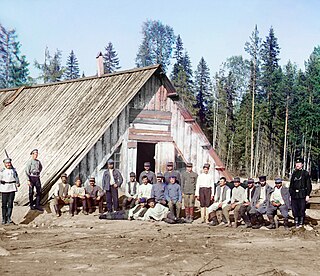 W
WA prisoner of war (POW) is a non-combatant—whether a military member, an irregular military fighter, or a civilian—who is held captive by a belligerent power during or immediately after an armed conflict. The earliest recorded usage of the phrase "prisoner of war" dates back to 1610.
 W
WThe International Red Cross and Red Crescent Movement is an international humanitarian movement with approximately 97 million volunteers, members and staff worldwide, which was founded to protect human life and health, to ensure respect for all human beings, and to prevent and alleviate human suffering. Within three distinct organizations that are legally independent from each other, but are united within the movement through common basic principles, objectives, symbols, statutes and governing organisations, there are the International Committee of the Red Cross (ICRC), that is a private humanitarian institution founded in 1863 in Geneva, Switzerland, in particular by Henry Dunant and Gustave Moynier. Its 25-member committee has a unique authority under international humanitarian law to protect the life and dignity of the victims of international and internal armed conflicts. The ICRC was awarded the Nobel Peace Prize on three occasions.
 W
WThe rehabilitation and reintegration of child soldiers is defined by Child Soldiers International as:"The process through which children formerly associated with armed forces/groups are supported to return to civilian life and play a valued role in their families and communities"
 W
WRepatriation is the process of returning an asset, an item of symbolic value, or a person—voluntarily or forcibly—to its owner or their place of origin or citizenship. The term may refer to non-human entities, such as converting a foreign currency into the currency of one's own country, as well as to the process of returning military personnel to their place of origin following a war. It also applies to diplomatic envoys, international officials as well as expatriates and migrants in time of international crisis. For refugees, asylum seekers and illegal migrants, repatriation can mean either voluntary return or deportation.
 W
WA Sarajevo Rose is a type of memorial in Sarajevo made from concrete scar caused by a mortar shell's explosion that was later filled with red resin. Mortar rounds landing on concrete during the Siege of Sarajevo created a unique fragmentation pattern that looks almost floral in arrangement, and therefore have been named "rose".
 W
WA scorched-earth policy is a military strategy that aims to destroy anything that might be useful to the enemy. Any assets that could be used by the enemy may be targeted, which usually includes obvious weapons, transport vehicles, communication sites, and industrial resources. However, anything useful to the advancing enemy may be targeted, including food stores and agricultural areas, water sources, and even the local people themselves, though the last has been banned under the 1977 Geneva Conventions.
 W
WService Children's Education (SCE) is an organisation of the United Kingdom government responsible for the education of the children of British Armed Forces families and Ministry of Defence (MoD) personnel serving outside of the United Kingdom. They provide schools and educational support services from Foundation Stage through to sixth form. They are headquartered at Trenchard Lines, Upavon, Wiltshire.
 W
WDuring World War I Switzerland accepted 68,000 British, French and German wounded prisoners of war (POW) for recovery in mountain resorts. To be transferred the wounded had to have a disability that would negate their further military service or interned over 18 months and deteriorating mental health. The wounded were transferred from prisoner of war camps unable to cope with the number of wounded and sat out the war in Switzerland. The transfer was agreed between the warring powers and organised by the Red Cross. The British entered into an agreement with Germany on May 2, 1916.
 W
WTelemachus is a figure in Greek mythology, the son of Odysseus and Penelope, and a central character in Homer's Odyssey. The first four books of the Odyssey focus on Telemachus's journeys in search of news about his father, who has yet to return home from the Trojan War, and are traditionally given the title the Telemachy.
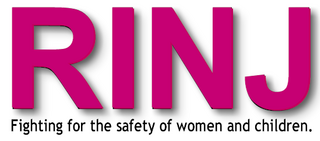 W
WThe RINJ Foundation (RINJ) is a Canadian incorporated global not-for-profit health care-related non-governmental organization women's group listed with the United Nations as an NGO with "a mission while supporting and medically caring for survivors, to also gather and compile detailed information on parties to armed conflict that are credibly suspected of committing or being responsible for acts of rape or other forms of sexual violence."
 W
WThe thousand-yard stare or two-thousand-yard stare is a phrase often used to describe the blank, unfocused gaze of combatants who have become emotionally detached from the horrors around them. It is also sometimes used more generally to describe the look of dissociation among victims of other types of trauma.
 W
WA truth commission, also known as a truth and reconciliation commission or truth and justice commission, is an official body tasked with discovering and revealing past wrongdoing by a government, in the hope of resolving conflict left over from the past. Truth commissions are, under various names, occasionally set up by states emerging from periods of internal unrest, civil war, or dictatorship. In both their truth-seeking and reconciling functions, truth commissions have political implications: they "constantly make choices when they define such basic objectives as truth, reconciliation, justice, memory, reparation, and recognition, and decide how these objectives should be met and whose needs should be served".
 W
WThe United Nations High Commissioner for Refugees (UNHCR) is a UN agency mandated to aid and protect refugees, forcibly displaced communities, and stateless people, and to assist in their voluntary repatriation, local integration or resettlement to a third country. It is headquartered in Geneva, Switzerland, with over 17,300 staff working in 135 countries.
 W
WA veteran is a person who had long service or experience in a particular occupation or field. A military veteran is a person who has served and is no longer serving in a military. A military veteran that has served directly in combat in a war is further defined as a war veteran.
 W
WThe United States has compensated military veterans for service-related injuries since the Revolutionary War, with the current indemnity model established near the end of World War I. The Department of Veterans Affairs (VA) began to provide disability benefits for post-traumatic stress disorder (PTSD) in the 1980s after the diagnosis had become part of official psychiatric nosology.
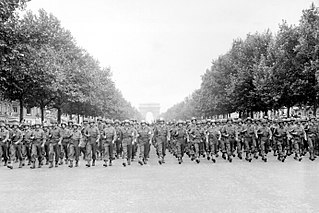 W
WA victory parade is a parade held to celebrate a victory. Numerous military and sport victory parades have been held.
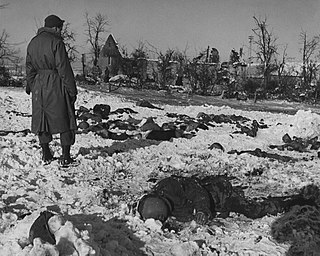 W
WA war crime is an act that constitutes a serious violation of the laws of war that gives rise to individual criminal responsibility. Examples of crimes include intentionally killing civilians or prisoners, torturing, destroying civilian property, taking hostages, performing a perfidy, raping, using child soldiers, pillaging, declaring that no quarter will be given, and seriously violating the principles of distinction, proportionality, and military necessity.
 W
WA war memorial is a building, monument, statue or other edifice to celebrate a war or victory, or to commemorate those who died or were injured in a war.
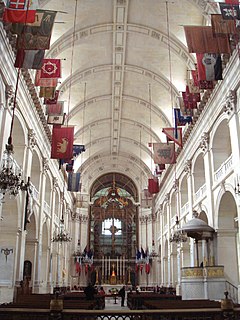 W
WIn ancient Greece and ancient Rome, military victories were commemorated with a display of captured arms and standards. A trophy was originally a war memorial assembled from such items on a battlefield. The Roman triumph also displayed these items as well as cultural objects, which later came to be called war trophies. Body parts of slain enemies have sometimes served as trophies since antiquity, in a practice called human trophy collecting. The recovery of Roman eagles taken as trophies by enemy forces sometimes inspired years of added warfare.
 W
WThe Washington Agreement was a ceasefire agreement between the Republic of Bosnia and Herzegovina and the Croatian Republic of Herzeg-Bosnia, signed in Washington on 18 March 1994 and Vienna. It was signed by Bosnian Prime Minister Haris Silajdžić, Croatian Foreign Minister Mate Granić and President of Herzeg-Bosnia Krešimir Zubak. Under the agreement, the combined territory held by the Croat and Bosnian government forces was divided into ten autonomous cantons, establishing the Federation of Bosnia and Herzegovina. The cantonal system was selected to prevent dominance by one ethnic group over another.
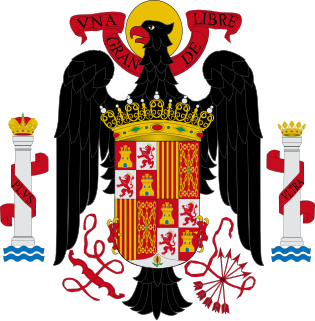 W
WWomen prisoners in Francoist Spain were often there because of specific repression aimed at women. During the Civil War, many women were in prison because family members had Republican sympathies or the authorities wanted to lure out male Republican affiliated relatives; it was not a result of anything the women did themselves. The Law of Political Responsibilities, adopted on 13 February 1939, made such repression easier and was not formally removed from the Criminal Code until 1966. Prisoners and people in concentration camps, both male and female, would total over three quarters of a million by the end of the Spanish Civil War. Of these, 14,000 women were held in Las Ventas Model prison in Madrid.